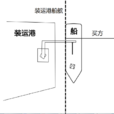调度场算法(Shunting Yard Algorithm)是一个用于将中缀表达式转换为后缀表达式的经典算法,由艾兹格·迪杰斯特拉引入,因其操作类似于火车编组场而得名。
基本介绍
- 中文名:调度场算法
- 外文名:Shunting Yard Algorithm
详细的算法
- 当还有记号可以读取时:
- 读取一个记号。
- 如果这个记号表示一个数字,那幺将其添加到输出伫列中。
- 如果这个记号表示一个函式,那幺将其压入栈当中。
- 如果这个记号表示一个函式参数的分隔设定(例如,一个半角逗号,):
- 从栈当中不断地弹出操作符并且放入输出伫列中去,直到栈顶部的元素为一个左括弧为止。如果一直没有遇到左括弧,那幺要幺是分隔设定放错了位置,要幺是括弧不匹配。
- 如果这个记号表示一个操作符,记做o1,那幺:
- 只要存在另一个记为o2的操作符位于栈的顶端,并且
- 如果o1是左结合性的并且它的运算符优先权要小于或者等于o2的优先权,或者
- 如果o1是右结合性的并且它的运算符优先权比o2的要低,那幺
- 将o2从栈的顶端弹出并且放入输出伫列中(循环直至以上条件不满足为止);
- 然后,将o1压入栈的顶端。
- 如果这个记号是一个左括弧,那幺就将其压入栈当中。
- 如果这个记号是一个右括弧,那幺:
- 从栈当中不断地弹出操作符并且放入输出伫列中,直到栈顶部的元素为左括弧为止。
- 将左括弧从栈的顶端弹出,但并不放入输出伫列中去。
- 如果此时位于栈顶端的记号表示一个函式,那幺将其弹出并放入输出伫列中去。
- 如果在找到一个左括弧之前栈就已经弹出了所有元素,那幺就表示在表达式中存在不匹配的括弧。
- 当再没有记号可以读取时:
- 如果此时在栈当中还有操作符:
- 如果此时位于栈顶端的操作符是一个括弧,那幺就表示在表达式中存在不匹配的括弧。
- 将操作符逐个弹出并放入输出伫列中。
- 退出算法。
C++程式实现
#include#include // 操作符// 优先权 符号 运算顺序// 1 ! 从右至左// 2 * / % 从左至右// 3 + - 从左至右// 4 = 从右至左int op_preced(const char c){ switch(c) { case '!': return 4; case '*': case '/': case '%': return 3; case '+': case '-': return 2; case '=': return 1; } return 0;}unsigned int op_arg_count(const char c){ switch(c) { case '*': case '/': case '%': case '+': case '-': case '=': return 2; case '!': return 1; default: return c - 'A'; } return 0;}#define op_left_assoc(c) (c == '+' || c == '-' || c == '/' || c == '*' || c == '%')#define is_operator(c) (c == '+' || c == '-' || c == '/' || c == '*' || c == '!' || c == '%' || c == '=')#define is_function(c) (c >= 'A' && c <= 'Z')#define is_ident(c) ((c >= '0' && c <= '9') || (c >= 'a' && c <= 'z'))bool shunting_yard(const char *input, char *output){ const char *strpos = input, *strend = input + strlen(input); char c, stack[32], sc, *outpos = output; unsigned int sl = 0; while(strpos < strend) { c = *strpos; if(c != ' ') { // 如果输入为一个数字,则直接入输出伫列 if(is_ident(c)) { *outpos = c; ++outpos; } // 如果输入为一个函式记号,则压入堆叠 else if(is_function(c)) { stack[sl] = c; ++sl; } // 如果输入为函式分割符(如:逗号) else if(c == ',') { bool pe = false; while(sl > 0) { sc = stack[sl - 1]; if(sc == '(') { pe = true; break; } else { // 直到栈顶元素是一个左括弧 // 从堆叠中弹出元素入输出伫列 *outpos = sc; ++outpos; sl--; } } // 如果没有遇到左括弧,则有可能是符号放错或者不匹配 if(!pe) { printf("Error: separator or parentheses mismatched\n"); return false; } } // 如果输入符号为操作符,op1,然后: else if(is_operator(c)) { while(sl > 0) { sc = stack[sl - 1]; // While there is an operator token, o2, at the top of the stack // op1 is left-associative and its precedence is less than or equal to that of op2, // or op1 is right-associative and its precedence is less than that of op2, if(is_operator(sc) && ((op_left_assoc(c) && (op_preced(c) <= op_preced(sc))) || (!op_left_assoc(c) && (op_preced(c) < op_preced(sc))))) { // Pop o2 off the stack, onto the output queue; *outpos = sc; ++outpos; sl--; } else { break; } } // push op1 onto the stack. stack[sl] = c; ++sl; } // If the token is a left parenthesis, then push it onto the stack. else if(c == '(') { stack[sl] = c; ++sl; } // If the token is a right parenthesis: else if(c == ')') { bool pe = false; // Until the token at the top of the stack is a left parenthesis, // pop operators off the stack onto the output queue while(sl > 0) { sc = stack[sl - 1]; if(sc == '(') { pe = true; break; } else { *outpos = sc; ++outpos; sl--; } } // If the stack runs out without finding a left parenthesis, then there are mismatched parentheses. if(!pe) { printf("Error: parentheses mismatched\n"); return false; } // Pop the left parenthesis from the stack, but not onto the output queue. sl--; // If the token at the top of the stack is a function token, pop it onto the output queue. if(sl > 0) { sc = stack[sl - 1]; if(is_function(sc)) { *outpos = sc; ++outpos; sl--; } } } else { printf("Unknown token %c\n", c); return false; // Unknown token } } ++strpos; } // When there are no more tokens to read: // While there are still operator tokens in the stack: while(sl > 0) { sc = stack[sl - 1]; if(sc == '(' || sc == ')') { printf("Error: parentheses mismatched\n"); return false; } *outpos = sc; ++outpos; --sl; } *outpos = 0; // Null terminator return true;}bool execution_order(const char *input) { printf("order: (arguments in reverse order)\n"); const char *strpos = input, *strend = input + strlen(input); char c, res[4]; unsigned int sl = 0, sc, stack[32], rn = 0;// While there are input tokens left while(strpos < strend) {// Read the next token from input. c = *strpos;// If the token is a value or identifier if(is_ident(c)) {// Push it onto the stack. stack[sl] = c; ++sl; }// Otherwise, the token is an operator (operator here includes both operators, and functions). else if(is_operator(c) || is_function(c)) {sprintf(res, "_%02d", rn);printf("%s = ", res);++rn;// It is known a priori that the operator takes n arguments.unsigned int nargs = op_arg_count(c);// If there are fewer than n values on the stackif(sl < nargs) {// (Error) The user has not input sufficient values in the expression.return false;}// Else, Pop the top n values from the stack.// Evaluate the operator, with the values as arguments.if(is_function(c)) {printf("%c(", c);while(nargs > 0) {sc = stack[sl - 1];sl--;if(nargs > 1) {printf("%s, ", &sc);}else {printf("%s)\n", &sc);}--nargs;}}else {if(nargs == 1) {sc = stack[sl - 1];sl--;printf("%c %s;\n", c, &sc);}else {sc = stack[sl - 1];sl--;printf("%s %c ", &sc, c);sc = stack[sl - 1];sl--;printf("%s;\n",&sc);}}// Push the returned results, if any, back onto the stack. stack[sl] = *(unsigned int*)res; ++sl; } ++strpos; }// If there is only one value in the stack// That value is the result of the calculation.if(sl == 1) {sc = stack[sl - 1];sl--;printf("%s is a result\n", &sc);return true;}// If there are more values in the stack// (Error) The user input has too many values.return false;}int main() { // functions: A() B(a) C(a, b), D(a, b, c) ... // identifiers: 0 1 2 3 ... and a b c d e ... // operators: = - + / * % ! const char *input = "a = D(f - b * c + d, !e, g)"; char output[128]; printf("input: %s\n", input); if(shunting_yard(input, output)) { printf("output: %s\n", output); if(!execution_order(output)) printf("\nInvalid input\n"); } return 0;}



